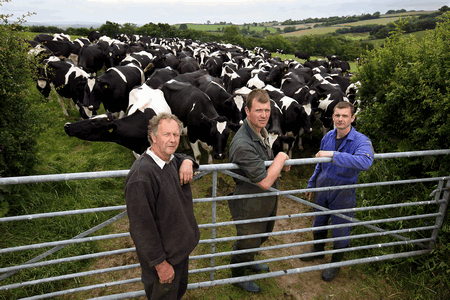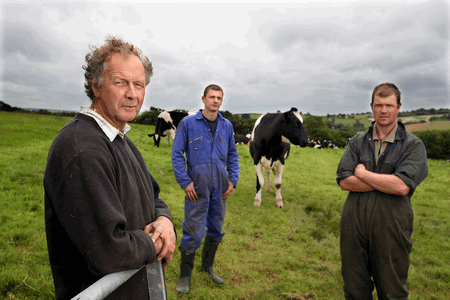Farming families feeling the pressure of bovine TB

The bovine tuberculosis crisis is putting farming families under immense mental, physical and financial strain, according to a West Country dairy farmer.
Barrie Timms and his sons, Andrew and Philip, farm at East Luddon near Thorndon Cross, Devon.
Their 120ha (300-acre) unit should be stocked with between 250 to 300 head. But TB movement restrictions mean the number of animals squeezed on to the farm is close to 500. And that is putting the business under pressure.
The farm had been clear of TB for 43 years. But a rising number of sick badgers, spotted on the farm, coincided with a herd breakdown in 2002. It was during summer grazing that the first infection occurred.
That pattern of breakdowns is now familiar.
“It’s always the same,” Barrie says. “During the winter, even though we have animals housed, we don’t get TB. So it isn’t down to cattle-to-cattle contact.
“It is at grass when the badgers and cattle mix that the TB infections begin again.
“Spring and summer should be the best times of the year, but you get to dreading turnout these days. It is very sad,” he adds.

The number of sick and dying badgers seen on the farm continues to rise and Andrew Timms says he is frustrated at the lack of action by DEFRA.
“If DEFRA or any animal lover came here and saw these badgers they would think again about a badger cull. The badgers are so sick that they die of TB,” he says.
“They are reduced to skin and bone and struggle to breathe. Their claws grow long because they are too weak to dig for food. In the end they just die either because they starve or because the abscesses they get burst and become infected.
“In the long term this whole delay is doing the badger a disservice – it is prolonging the disease and prolonging the suffering,” Andrew says.
Barrie adds that he tried to get DEFRA to visit so they could see the suffering for themselves. “But they wouldn’t come because they said it wasn’t their job to do so.”
Not all DEFRA staff are uncaring, though. The vets are increasingly sympathetic, he says.
DEFRA vets break ranks
“There is a breaking of ranks. Some of them tell us they are behind us now.
“They know exactly what is going on. It is politicians and people who think they are helping badgers by stopping any cull that are causing us all these problems,” Barrie says.
In the meantime the disease is costing the farm a fortune.
The milk cheque is falling because the business cannot buy more stock in to replace the lost milkers – 10 have gone this week bringing the number of cattle slaughtered to 17 this summer.
“Roughly speaking yields are about 10% down while the feed costs are going through the roof,” Barrie says.
He adds that other pressures are mounting on the finances.

There’s no sense of satisfaction for Barrie (left), Philip and Andrew Timms any more – just relief
“One line of revenue that has gone is the regular sale of in-calf heifers. We cannot sell them now, which hits our cashflow hard.”
And Barrie says the compensation at £1229 for each animal doesn’t come close to the cost of buying in new animals.
“To replace 45kg milkers would cost us about £2000 each. The compensation is £500-£600 short of the real cost,” Barrie says, while the extra numbers of animals that needed to be fed meant the increasing feed price was having a much bigger impact.
Labour input is also huge and the lengthy process of feeding round in the winter can be exhausting, Barrie says.
“Three of us spend four hours feeding in the winter mornings and almost two hours in the evening.”
Andrew agrees that the feeding routine is demoralising.
“All we seem to do is feed and test. We have always worked hard, but it is getting terrible and the feeling you get is different from how it used to be.
“When we do get clear of TB, and we can sell a few animals, the sense of achievement is not the same as it was.
“We used to feel like we were progressing, doing a good job, like we had achieved something.
“Now to be honest it is just a sense of relief when we can move some cattle on. That’s all really, there’s no sense of satisfaction any more – just relief.”
